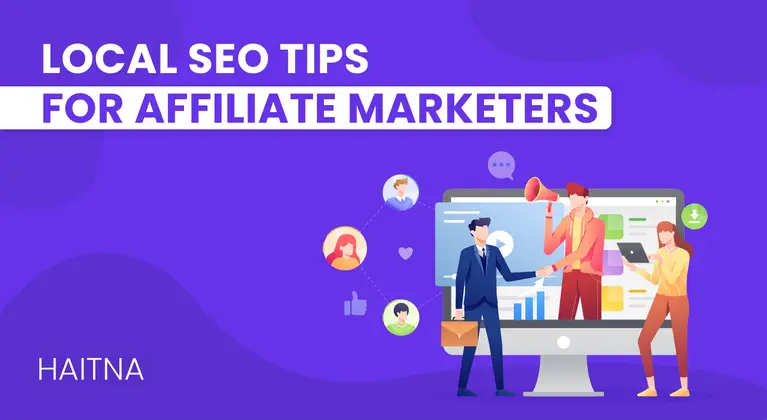
Affiliate Marketers: Here Are the Local SEO Tips to Crush Your Competition
Affiliate marketing is where an affiliate earns a commission for promoting and selling a product belonging to another brand/ person.
Statistics show that 80% of the brands have affiliates, while almost 65% of the affiliate marketers generate traffic only through blogging. SEO plays a massive role in generating organic traffic.
Let's look at how local SEO can help affiliate marketers increase sales and earn more commission.
12 Local SEO Tips for Affiliate Marketers
1. Engage on Social Media
Social media is considered one of the best places for affiliate marketing. Whether finding brands to become an affiliate or identifying the target audiences, becoming an influencer is easy on social media.
Facebook, Instagram, LinkedIn, and Twitter are the leading platforms. Snapchat and TikTok are also popular, though TikTok is banned in India.
Google includes social media pages in search results, giving you an excellent opportunity to reach your local market. Complete the profile and include the local address. Google can easily identify your profile for the relevant local keywords.
Tips for using social media:
- Run ads to reach more users. Facebook provides filters to set the target audience for ads with precision.
- Focus on Gen Z and millennials on social media; they are always online and prefer online purchases.
- Link the images you post on social media sites. Every click can lead to a potential sale.
Here’s a screenshot of a brand’s link on its Instagram profile promoting leads:
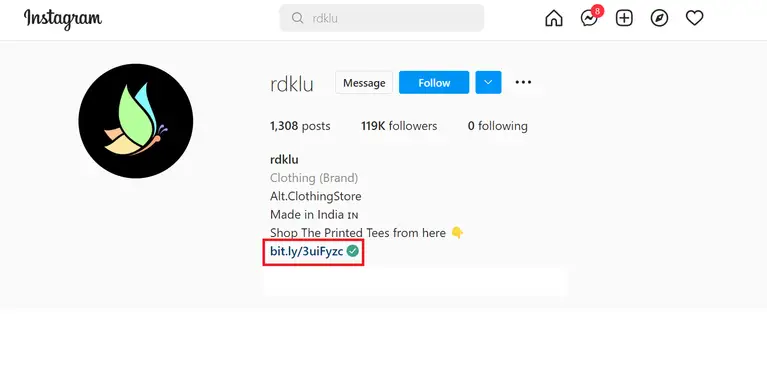
2. Create Google My Business (GMB) Profile
Google My Business is the heart of local search. To ace local SEO, you must have a GMB profile for your affiliate marketing business.
Create a GMB profile and verify it. Use Google Posts to share updates for limited period offers and discounts. Ask customers to review GMB profiles to increase traffic and credibility.
The advantage of having a GMB profile goes beyond local SEO. When users search for your business, Google will share the profile as the first search result.
Users gain access to more information such as your address, contact information, location map, website, social media handles, etc., from the GMB profile.
But how do you increase visibility for your affiliate business in the local market:
- Don’t stuff keywords in the title or description. Use the local names wisely.
- Ensure the NAP (Name, Address, Phone Number) details are up to date.
- Meet prospective local customers in person.
Here’s a screenshot of Google My Business:

3. Research Local Keywords
Keywords are the backbone of SEO. Local keywords are pretty easy to identify. They include the location name, landmark, and niche-related word(s). You still have to research long-tail local keywords to reach the target audiences.
You must put in a little extra effort as an affiliate marketer to attract users to your business website/ blog.
Use keyword tools to search for relevant local keywords with high search volume and low competition. It will help you rank higher on the search results page and increase your chances of reaching more users.
Our top three free tools are:
- Google Trends: It shows the relative search popularity over time. Check data for the past 12 months to get a better idea.
- Keyword Generator: You get up to 150 keyword ideas for a given seed keyword, along with Keyword Difficulty (KD) score.
- Answer the Public: It provides questions, searches, comparisons, etc., for the input keyword.
Here’s a screenshot of Google Trends:
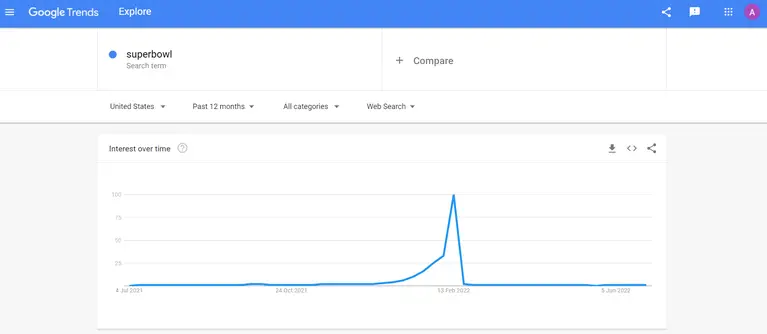
4. Optimize Your On-Page
Once the local keywords are ready, it's time to optimize the website for search engines. You must routinely update your website/ blog content to remain at the top of search results.
Use the local keywords in multiple places across the website and webpage. Every blog post must be indexed on the search engine to appear in the results - including the keywords in the body of the blog is not enough.
Make sure to add the local keyword in the following sections of the webpage/ blog post:
- Heading of the post
- Title tags
- URL of the post
- Meta description
- Footer
- Image alt tags
Local keywords can bring organic traffic. But to convert visitors to customers, you need to provide them with valuable information/ content that urges them to purchase through the link.
You can optimize your on-page using Yoast SEO:
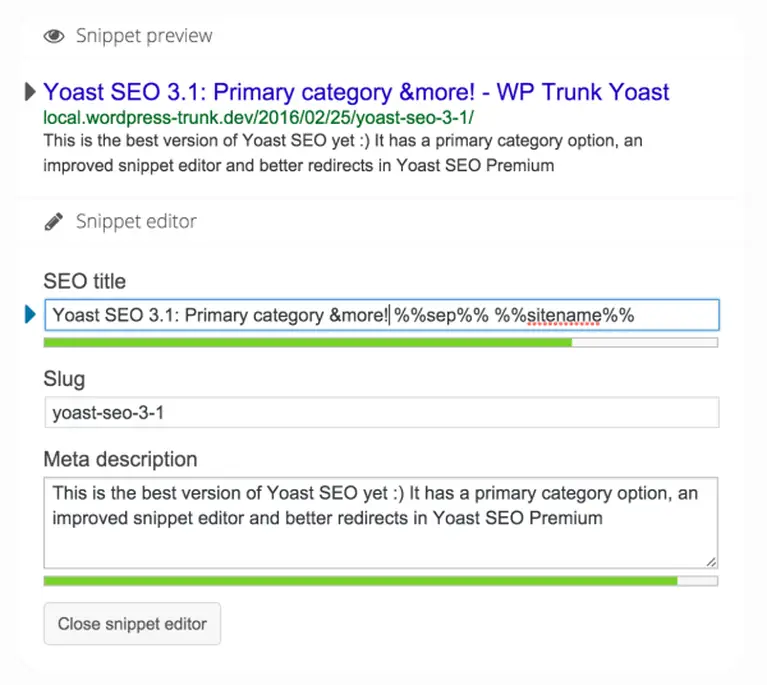
5. Optimize for Mobile Phones
More than 75% of mobile search users have visited the business within a day. Optimizing the website for local mobile search will bring steady traffic to the site.
Statistics show that around 30% of Google mobile searches are location-related. Mobile searches also have a higher conversion rate.
A website not optimized for mobile phones is likely to lose business due to its lack of user-friendliness. It can harm your affiliate marketing business and reduce your commission. Prospective customers are likelier to go to a competitor (another affiliate).
Use the following tools to optimize the website for mobile phones:
- Google Mobile-Friendly Test: The free tool validates the website to assess if it has been optimized for mobiles or not.
- PageSpeed Insights by Google is a free tool to identify the website's loading speed on desktops and mobile phones.
- Mobile SEO by Varvy: The free tool overviews the website’s mobile performance.
Here’s a screenshot of Google’s Mobile-Friendly Test Tool:

6. Optimize for Voice Search
Voice search has grown due the last few years, thanks to the increasing use of mobile phones and smart assistants like Siri, Alexa, Google Assistant, etc. Statistics by PwC show that nearly 70% of users between 25 and 49 years speak to their voice-enabled devices at least once daily.
Affiliate marketers who wish to attract local audiences need to optimize the website for voice search. The keywords used for voice search are longer and more specific to get the exact results.
Semantics play a crucial role in voice search. The following tools can help you optimize the website for voice SEO:
- Keyworddit: The tool gathers keywords from forums like Reddit.
- Long Tail Pro: It is a paid tool to filter keywords for voice search.
- Google Correlate: You can’t go wrong with Google tools. Google Correlate gives insights about keywords, content, and queries.
Here’s a screenshot of Long Tail Pro:
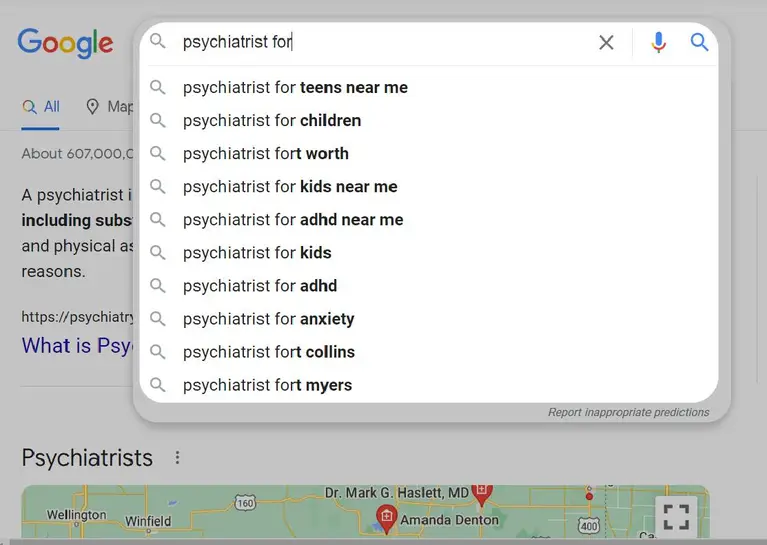
7. Get Reviews from Local Customers
Reviews are a must for every business. We aren't talking about reviews for the brands you promote but your website/ blog. You must assure the users that they can trust the content on your site and use the links to make a purchase.
Reviews from your customers will convince users to route their purchases through your website.
Local reviews are essential in establishing the credibility of a business. It creates a sense of familiarity when users see others from their region as happy customers.
Good reviews also help you rank better in search engines and increase visibility. Be it on social media, website, or GMB profile, get reviews from local customers.
Here are a few tips to make the most of reviews:
- Respond to each review politely, irrespective of what it says.
- Offer something of value to dissatisfied customers.
- Ask happy customers to review and promote your website on social media.
Here’s an example of an individual promoting a blog post on social media:
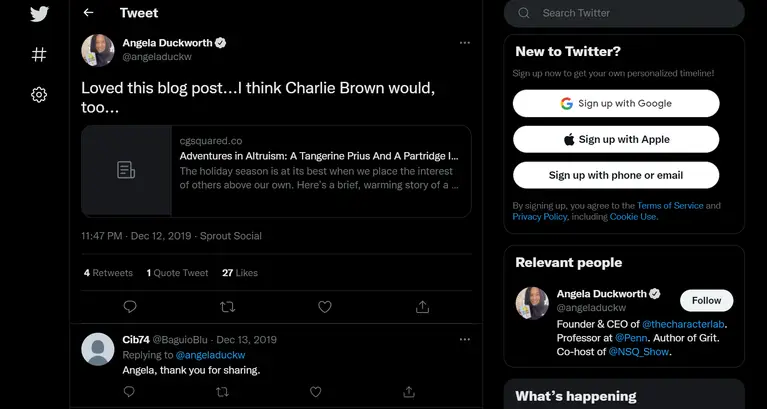
8. Focus on Inbound Link Building
Inbound links can increase your SEO rank and play a crucial role in general and local SEO. The inbound links for local SEO should come from local sources.
The simplest way to get a high-quality inbound link is by asking the brands to mention you as an affiliate on their websites.
You can contact the distributors to list your website as an alternate place of purchase.
Guest posting is another popular way to generate inbound links—contact websites and e-magazines to submit guest blogs for the niche market.
As a guest blogger, you can add a link to your website with your name.
The following tools can help you build links for the affiliate website:
- Ahrefs: Ahrefs is the best link-building tool in the market, with a crawler second only to Google’s.
- Google: Google Search Operators help find potential link-building sites for free.
- Buzzstream: Buzzmarker is a Chrome extension for link building. It is a paid tool.
Here’s a screenshot of Buzzstream’s link-building tool:
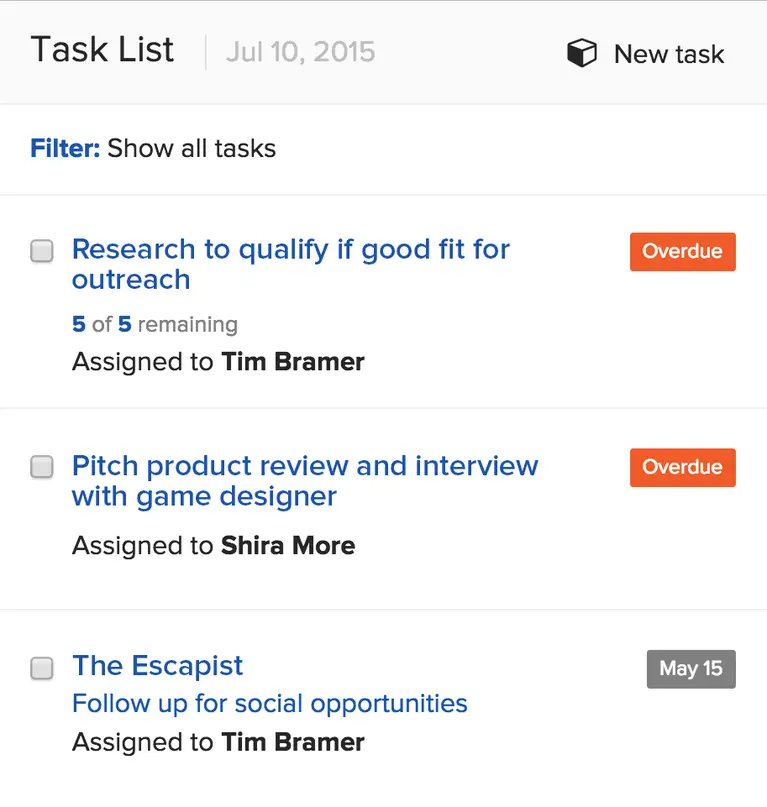
9. Be an Active Community Member
Getting inbound/ backlinks from guest blogs and brands is not enough in this competitive market. You need to work with the locals to create a presence in the local market. That includes being an active part of the local community.
Partner with local establishments and businesses. Sponsor for events in the target area.
Being an active community member will increase your online and offline reach. When you sponsor an event, contest, or giveaway, you get backlinks to the website, tags, mentions on social media, and loads of promotions.
Here are a few other ways to improve your local SEO efforts through community activity:
- Volunteer at a non-profit organization and post your experiences on the website/ social media.
- Attend offline and virtual events to interact with other regional businesses (including your competitors).
- Give a shout-out to your favorite local businesses. They’ll return the favor.
Here’s an example of giving a local business a shout-out on Twitter:

10. Create Location Pages on the Website
Add location pages to your websites. Every local/ region should have an exclusive page of its own. You can redirect visitors to the respective location based on their IP location. Subscribers can choose the location they want to get updates from your site.
Once you create the location pages, it’s time to customize them for the local audiences.
You should tailor the content for local audiences rather than the global market. Refer to local landmarks, specialties, celebrities, or important pieces of history.
Read: How to Optimize Categories & Tag Pages for Local Businesses
How do we attract the local audience through location pages? Take a look:
- If you own an office or a store, include the Google Map with the address of the place.
- Add images from the locality (you can also post pictures of yourself in the area).
- Use localized greetings and CTA (Call to Action) words/ phrases to connect with the audience.
Here’s an example of a location page:
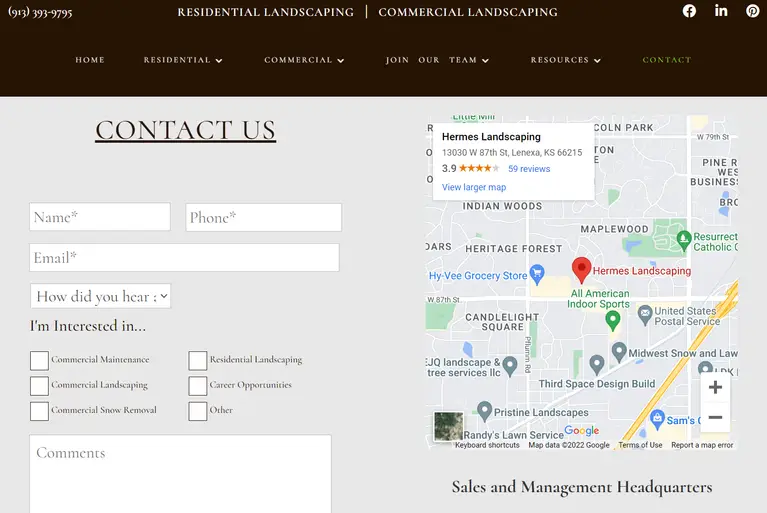
11. Focus on NAP Citations
NAP is short for Name, Address, and Phone Number.
A NAP citation is where you or someone else on the internet share this information on places other than your website.
A NAP citation works similarly to a backlink and brings more visitors to the website. If the citations are posted on high-quality websites, it improves your search engine rank.
Citations are integral to local SEO and help build a strong presence in the selected target market. However, tracking and managing citations for your affiliate marketing business is time-consuming without using any tool.
The top three tools to manage local citations are:
- Moz Local: It helps build citations and clean up the ones from low-quality/ dubious sites.
- Whitespark: It offers two tools, a local citation finder, and a local rank tracker, to help you manage local citations.
- ReviewTrackers: It helps manage online reviews and citations with ease. However, it is a paid tool.
Here’s a screenshot of Moz Local’s dashboard:

12. Enlist in Local Online Directories
A business directory is a complication of online and offline businesses. The businesses are listed alphabetically and categorized based on the niche/ industry and locality.
People use directories to obtain a list of businesses that offer products/ services they are looking for. A directory is an exhaustive collection of numerous businesses and a great way to show up in the local search results.
Being a part of local online directories (free and paid) will bring citations, backlinks, and visitors to your affiliate website. Make sure to verify the authenticity of the directory before adding your site.
Leading directories that help improve local SEO efforts:
- Bing Places: It belongs to Microsoft and is an online directory on the Bing search engine.
- Yelp: It is a social directory that shares reviews and recommendations about countless businesses.
- Yellow Pages: It is one of the leading online directories in the US, with heavy search traffic.
Here’s a screenshot of Yelp:
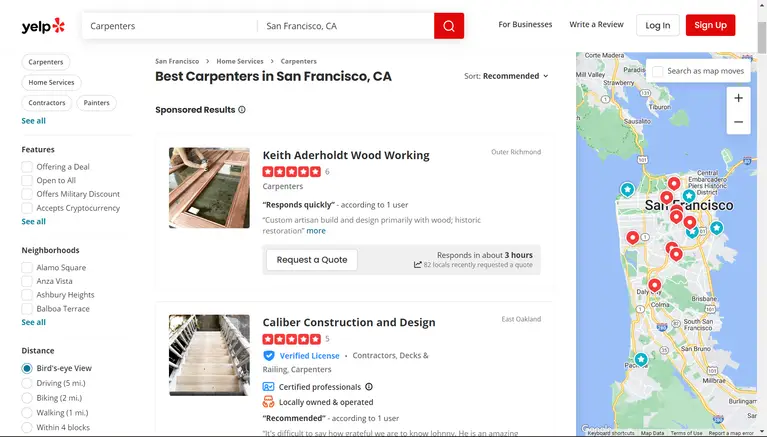
Local SEO for Affiliate Marketers – FAQs
1. Is Local SEO Necessary For Affiliate Marketers?
Yes, local SEO is vital for affiliate marketers as it increases the visibility of your business among the local audiences. It helps you focus on specific areas to increase sales and generate more commission.
2. How Is Local SEO Different From General SEO?
The difference between local SEO and general SEO is the target market. Local SEO focuses on highlighting the location of your business and includes more than website optimization. General SEO attracts users based on the niche market.
3. Is Local SEO Enough For Affiliate Marketing?
No, local SEO alone is not enough for affiliate marketers. To become a successful affiliate marketer, you need a combination of local and general SEO, social media marketing, content marketing, and paid marketing. Keep track of competitors too.
4. What Are The Top Five Local SEO Tools In The Market?
The following are the top five local SEO tools used by marketers:
- Google Search Console (free)
- SEMRush (free & paid)
- Buzzstream (free & paid)
- Ahrefs (free & paid)
- Screaming Frog (free & paid)
5. What Is The Role Of Geo Sitemap In Local SEO?
Geo sitemaps make geospatial content searchable and accessible on search engines. It increases your local SEO results by providing search engines with the geographical details of your business. Your website can rank higher on the SERPs.
Key Takeaways
- Create and update your Google My Business profile.
- Stay active and post on social media.
- Use local keywords to rank higher on SERPs.
- Optimize the website for mobile and voice search.
- Get more reviews from local customers.
- Go live on social media from the location.
- Sponsor for local community events.
- Add individual location pages to the website.
- Add the business to local and niche directories.
- Use free and paid local SEO tools for website optimization.
- Track your competitors and their progress.
ABOUT THE AUTHOR:
Brice Decker

Brice has been handling marketing projects for more than 12 years and he is providing consulting services on SEO, Social Media and PPC. He has a huge expertise in working at large corporations including Accenture Interactive & PwC Digital Services.
ABOUT THE AUTHOR:
Brice Decker

Brice has been handling marketing projects for more than 12 years and he is providing consulting services on SEO, Social Media and PPC. He has a huge expertise in working at large corporations including Accenture Interactive & PwC Digital Services.
Related Post
How to Rebrand Your Business Without Losing SEO?